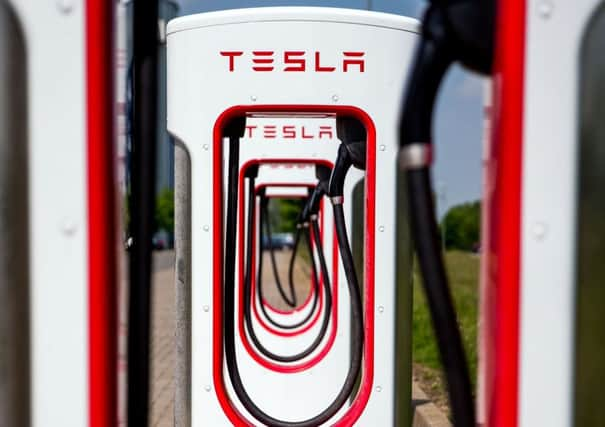Martyn McLaughlin: Politicians must drive electric car revolution


The focus of their attention was a new parking bay, and beside it, a slim charging point. It was, opined one observer, an eyesore. Another went further. wondering aloud whether it was in breach of planning laws.
If this sort of is overreaction is commonplace in Scotland’s commuter belts, where SUVs and 4x4s line leafy streets, it seems the news that the electric car revolution is upon us clearly has yet to filter far and wide. On the one hand, the installation of the village’s first chargepoint made for classic chat for the Nimby brigade, but it also spoke of a wider problem; the surge in green motoring should not be taken for granted.
Advertisement
Hide AdAdvertisement
Hide AdI wonder what the same moleskin brigade must have thought when, last week, Volvo became the first major car manufacturer to sound the death knell of the conventional engine. The Swedish firm’s announcement that, as of 2019, every new model in its range will be solely hybrid or electric, is a landmark moment for an industry besieged by scandal and consumer mistrust; an innovation long dismissed as a fad looks to be on the cusp of going mainstream.
The speed at which the electric car is predicted to become a mass market reality has taken many by surprise, with some observers doubtful that the aggressive timescale mooted by Volvo and others is realistic.
Given the internal combustion engine has powered our transport needs for the past century, the cynicism is deep-rooted, a stance further ingrained by the historical high forecourt prices of electric vehicles and the psychological barriers among drivers who fear running out of power between charges.
The transition will be eased by attitudinal shifts, but the greatest driver of change will be altogether more simple: it boils down to economics.
Over the past seven years, the average cost of lithium-ion battery packs used in electric cars has fallen by two-thirds to around £233 per kilowatt-hour, with the price expected to plummet to £56 as manufacturers continue to improve their design and functionality.
The upshot is that, in the space of a decade, the cost of plug-in electric cars will fall into line with petrol or diesel models, even after government subsidies and fuel savings are taken out of the equation.
The research group Bloomberg New Energy Finance predicts that by 2040, sales of new plug-in hybrids and all-electric cars will outnumber those of their combustion engine counterparts.
“Our forecast doesn’t hinge on countries adopting stringent new fuel standards or climate policies,” explains Colin McKerracher, the group’s head of advanced transport analysis.
Advertisement
Hide AdAdvertisement
Hide Ad“It’s an economic analysis, looking at what happens when the upfront cost of electric vehicles reaches parity. That’s when the real shift occurs.”
The cost issue may well bring about a change in consumer behaviour, but if the electric car is to become a mainstay of our roads, it will require more than affordability.
In the rush to welcome Volvo’s announcement, there has been too little discussion of the infrastructural barriers that stand in the way of the new technology’s march.
The network of publicly available charge points is growing and in Scotland, now numbers close to 1,000, but how many are located on residential streets, thereby allowing drivers in high-density urban areas to plug in their vehicles overnight?
In Scotland’s major cities, where traditional tenement housing grids dictate a lack of on-street, let alone off-street parking, this question becomes especially relevant.
While 21 per cent of people in England live in flats, the figure in Scotland is considerably higher at 36 per cent; in Edinburgh and Glasgow, it rises to 60 per cent and 66 per cent respectively.
This constitutes hundreds of thousands of potential customers – but only if a practical and convenient solution is found.
Solving the problem will not be easy, nor cheap, and will require close collaboration between government, local authorities, utility firms, and the car industry.
Advertisement
Hide AdAdvertisement
Hide AdThe biggest hurdle, however, will be convincing the private sector, where landlords and the owners of private car parks have no incentive to make sizeable investments.
There are a few promising signs of progress. With no fanfare, the Office for Low Emission Vehicles, a UK government agency, has been helping to part-fund the installation of on-street charge points up and down the country, handling applications from local authorities on a first-come, first-served basis.
It is a excellent scheme, but its efficacy is undercut somewhat by the fact it has only £1.5 million to play with in the current financial year.
Such a derisory sum is hardly in keeping with the government’s zero emission ambition, and in the wake of Volvo’s announcement, it feels indicative of a piecemeal approach.
Indeed, what is most striking about Volvo’s announcement is the way it has proposed a drastic revision of the relationship between government and industry.
Since time immemorial, the role of the former has been to legislate and regulate for the wider public good, a framework which demands innovation on the part of the latter.
Now, however, it is the much maligned car industry that is throwing down the gauntlet and asking the government to rise to the challenge of realising a low-carbon future.